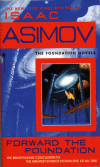Happy birthday Isaac Asimov! I started casually reading “In Memory Yet Green,” last month in my spare time. I would take it with me to places I expected to wait like the doctor’s office or something like that. It has been satisfying to finally get to know the author of my favorite science fiction series. According to this first volume of his autobiography, there is no real record of Isaac Asimov’s birthday. He was born in Petrovichi, Russia around 1920 and chose arbitrarily to celebrate his birthday on January 2nd.
Sadly, Isaac Asimov died of heart and kidney failure complications due to AIDS on April 6, 1992. He contracted HIV from a blood transfusion during a heart bypass operation in 1983. This link to HIV and AIDS wasn’t revealed until later when Janet Asimov published “It’s Been a Good Life,” in 2002.
It is a shame that such a talented author died before his time, but not before he wrote or edited over 400 books and countless essays and letters. I would have loved see how he continued his Robot and Foundation novels in the future. Hopefully I will find time to read some of his non-fiction this year, which most of his writing consists of. For a start, I received “Yours, Isaac Asimov: A Life in Letters,” for Christmas. I’m sure that it will be very interesting. If you haven’t read anything by Asimov, you should visit your local library or run a creative Google search. You’ll be in for a treat.

